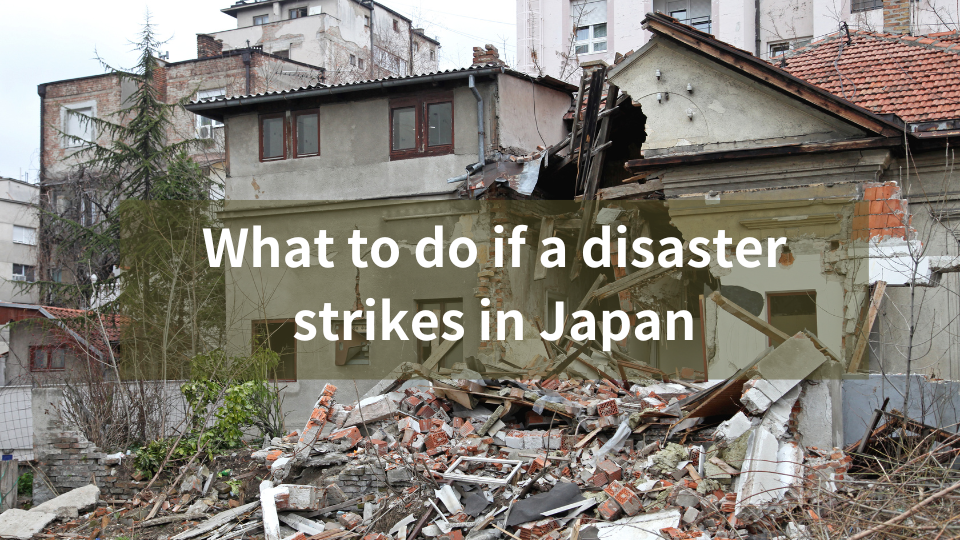Japan is a country prone to natural disasters such as earthquakes and typhoons. If you encounter an unexpected disaster during your visit, it is crucial to know how to respond appropriately. In this article, we will explain in detail how foreign tourists can deal with earthquakes and other disasters during their stay in Japan.
1. Basic Actions During a Disaster
In Case of an Earthquake
- Ensure Safety:
- If you are indoors, hide under a table to protect your head and wait until the shaking stops.
- If you are outside, stay away from objects that could collapse, such as signboards, glass, or utility poles.
- Check Evacuation Routes:
- Familiarize yourself with evacuation routes at your accommodation (such as hotels) in advance.
- Know the location of emergency exits and use stairs instead of elevators.
- Gather Information:
- Use NHK English broadcasts or multilingual information services from local governments to obtain accurate information during emergencies.
In Case of Typhoons or Tsunamis
- Pay Attention to Warnings:
- Obtain the latest warning information from the Japan Meteorological Agency website or hotel staff.
- Check Evacuation Locations:
- If near the coast, evacuate to higher ground as soon as possible due to the risk of tsunamis.
2. Ways to Get Disaster Information
Japan provides multilingual disaster information services for foreign tourists.
- Smartphone Apps:
- “Safety tips” app (available in English, Chinese, Korean, etc.): Receive emergency notifications during disasters.
https://www.rcsc.co.jp/safety-tips-en - Google Maps: Check evacuation shelter locations.
https://www.google.co.jp/maps/
- “Safety tips” app (available in English, Chinese, Korean, etc.): Receive emergency notifications during disasters.
- Websites:
- Japan Safe Travel (JST): Operated by the Japan National Tourism Organization (JNTO), providing the latest disaster information.
https://www.japan.travel/en/japan-safe-travel-information/ - Japan Meteorological Agency (https://www.jma.go.jp): Offers real-time information on typhoons and earthquakes.
- Japan Safe Travel (JST): Operated by the Japan National Tourism Organization (JNTO), providing the latest disaster information.
- Using Social Media:
- Follow official accounts of foreign embassies in Japan or local governments on X.
- Examples: “@JapanSafeTravel” and “@nhk_world”
3. How to Stay in an Evacuation Shelter
During a disaster, you may need to move to a designated evacuation shelter. Keep the following points in mind:
- Registration Process:
- Provide your name, nationality, and accommodation details.
- Use written communication tools in English to facilitate communication.
- Evacuation Etiquette:
- In Japan, it is important to act quietly and cooperate with others.
- Food and water are shared resources, so be mindful of consumption.
- Health Management:
- Ensure access to blankets and drinking water to cope with stress and cold.
- If you have chronic illnesses, manage your medication properly.
4. Useful Japanese Phrases
Knowing simple Japanese phrases can be reassuring during a disaster.
- “Tasukete kudasai” (Help me!)
- “Hinanjyo wa doko desu ka?” (Where is the evacuation shelter?)
- “Eigo o hanasemasu ka?” (Can you speak English?)
- “Mizu o kudasai” (Please give me water)
5. Preparations Beforehand
Making the following preparations before traveling can help you respond smoothly in the event of a disaster.
- Register Emergency Contacts:
- Be aware of contact details for embassies and consulates in Japan.
- Identify Wi-Fi hotspots to stay in touch with family and friends.
- Prepare an Emergency Kit:
- Carry copies of your passport, cash, bottled water, and emergency food.
- Bring a charger and mobile battery.
- Confirm Safety at Accommodation:
- Choose hotels with earthquake-resistant structures.
- Ask hotel staff about evacuation sites.
6. Actions After a Disaster
Even after the disaster subsides, it is important to ensure your safety. Follow these steps:
- Check Your Safety:
- Use social media or messaging apps to inform family and friends of your safety.
- Plan Your Next Move:
- Check the operation status of airports and transportation, and find safe routes for travel.
- Mental Care:
- Be mindful of mental health and stress relief following a disaster.
Conclusion
While the possibility of encountering natural disasters during a trip to Japan cannot be completely ruled out, being prepared and knowing how to act appropriately can help ensure a safe and enjoyable trip. Stay informed and prioritize safety at all times.



